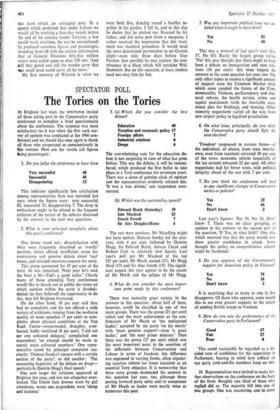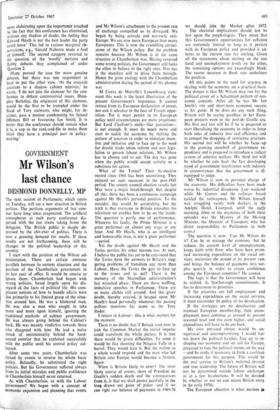The Tories on the Tories
SPECTATOR POLL
At Brighton last week the SPECTATOR invited all those taking part in the Conservative party conference to complete a brief questionnaire about the conference. The response was most satisfactory (as it was when the first such sur- vey of opinion was conducted at the 1966 con- ference) and we should like once again to thank all those who cooperated so conscientiously in this venture. Here are the results (all figures being percentages):
1. Do you judge the cvnference to have been Very successful
Successful as
ao
12
Disappointing This indicates significantly less satisfaction among representatives than was recorded last year, when the figures were: very successful 62, successful 31, disappointing 7. The drop in enthusiasm ought to be related to the frequent criticism of the nature of the debates disclosed by the answers to the next two questions.
2. What is your principal complaint about this year's conference?
One theme stood out: dissatisfaction with what were frequently described as 'woolly' motions, which offered insufficient scope for controversy and genuine debate about 'real' issues, and revealed excessive concern for unity.
This group accounted for 47 per cent of the total. As was remarked, 'Next year let's rock the boat a bit—Ted's a good sailor.' Clearly many of those attending Tory conferences would like to thrash out in public the issues on which opinion within the party is divided: denied (as they believed) the opportunity to do this, they left Brighton frustrated.
On the other hand, 19 per cent said they had no complaint, and the rest offered a wide variety of criticisms, ranging from the mediocre quality of some speeches (7 per cent) to com- plaints about physical conditions at the Top Rank Centre—overcrowded, draughty, over- heated, badly ventilated (8 per cent). 'I did not see one coloured delegate,' complained one respondent; 'an attempt should be made to recruit more coloured members.' One repre- sentative stated his principal complaint suc- cinctly: 'Duncan Sandys's success with a certain section of the party': so did another: The nauseating hypocrisy of the debate on drugs— particularly Quintin Hogg's final speech.'
One new target for criticism appeared at Brighton this year, and was not altogether over- looked. The Union Jack dresses worn by girl attendants, wrote one respondent, were 'cheap and tasteless.' 3. (a) Which did you consider the best debate?
Education 40 Taxation and economic policy 17 Foreign affairs 7 Industrial relations 6 Drugs 6 The overwhelming vote for the education de- bate is not surprising in view of what has gone before. This was the debate, it will be remem- bered, which produced the first ballot to take place at a Tory conference for seventeen years. There was a sense of genuine clash of opinion and the representatives evidently relished this. 'It was a true debate,' one respondent com- mented.
0)) Which was the outstanding speech?
Edward Heath (Saturday) 39 lain Macleod 25 Enoch Powell 7 Sir Alec Douglas-Home 6 The rest were nowhere. Mr Maudling might not have spoken. Duncan Sandys led the also- rans, with 4 per cent, followed by Quintin Hogg, Sir Edward Boyle, Selwyn Lloyd and Robert Carr (a relatively new figure). Last year's poll put Mr Macleod at the top (25 per cent), Mr Heath second (21), Mr Hogg third (17) and Sir Alec fourth (15). The signifi- cant aspects this year appear to be the ascent of Mr Heath and the eclipse of Mr Hogg.
4. What do you consider the most impor- tant point made by this conference?
There was naturally great variety in the answers to this question: about half of them, however, could be classified in one of two main groups. There was the group (21 per cent) which saw the main achievement as the con- firmation of Mr Heath as 'the undisputed leader,' accepted by the party 'on his merits' with 'mass genuine support'—even 'a great leader,' and 'the next prime minister.' Then there was the group (27 per cent) which saw the most important point in the assertion of the difference between Conservatives and Labour in terms of freedom; this difference was expressed in varying forms, often stipulat- ing taxation reform (or lower taxation) as an essential Tory objective. It is noteworthy that these same groups dominated the answers to this question last year, too, although those putting forward party unity and/or acceptance of Mr Heath as leader were nearly twice as numerous this year.
5. Was any important political issue not de- bated when it ought to have been?
Yes 52 No 48 This was a reversal of last year's vote (Yes 37, No 63). Easily the largest group voting 'Yes' this year thought that there ought to have been a debate on immigration and race rela- tions (16 per cent): this issue topped the answers to the same question last year, too. The only other topics to receive a significant amount of support were the Common Market (with which some coupled the future of the Com- monwealth), Vietnam, parliamentary and elec- toral reform, the health service, crime and capital punishment (with the inevitable occa- sional plea for birching), and housing. Other minority suggestions varied all the way from new airport policy to legalised prostitution.
6. On what issue, principally, do you think the Conservative party should fight the next election?
'Freedom' (expressed in various forms—of the individual, of choice, from state interfer- ence, even from taxation) attracted 30 per cent of the votes; economic reform (especially of the tax system) attracted 32 per cent. All other suggestions had far fewer votes, with political integrity ahead of the rest with 7 per cent.
7. Do you think the conference will lend to any significant changes in Conservative tactics or policies?
Yes 32 No 66 Don't know 2 Last year's figures: Yes 39, No 54, Don't know 7. There was no clear grouping of opinion in the answers to the second part of the question, `If Yes, in what field?' One idea which recurred was that the party would now show greater confidence in attack. Some thought the policy on comprehensive schools might be 'hardened.'
8. Do you approve of the Government's support for American policy in Vietnam?
Yes 79 No 18 Don't know 3 It is surprising that as many as one in five disapprove. Of those who approve, some would like to see even greater support, to the extent of sending British troops to Vietnam.
9. How do you rate the performance of the Conservative party in Parliament?
Good 67 Fair 27 Poor 6 This could reasonably be regarded as a de- cided vote of confidence for the opposition in Parliament, bearing in mind how ethical an eye party rank-and-file members keep on M.
10. Representatives were invited to make fur- ther observations on the conference on the back of the form. Roughly one third of those who replied did so. The majority fell into one of two groups. One was reasserting and in some cases elaborating upon the importance attached to 'the fact that this conference has eliminated, without any shadow of doubt, the feeling that Edward Heath is not the best leader the party could have.' This led to various marginal ob- servations, e.g., 'Gerald Nabarro made a fool of himself.' The second category reverted to the question of the 'woolly' motions and flabby debates they complained of under Question 2.
Many pressed the case for more genuine debates, but there was one respondent at least to put the other view. 'As the research assistant to a shadow cabinet minister,' he wrote, 'I do not join the clamour for the con- ference to debate controversial issues. Hum- phry Berkeley, the originator of this clamour, would be the first to be trampled under the flood of Tory stalwarts, who might, for in- stance, pass a motion condemning his Sexual Offences Bill or favouring Ian Smith. It is better that the conference should remain what it is, a sop to the rank-and-file to make them think they have a principal part in policy- making.'











































 Previous page
Previous page